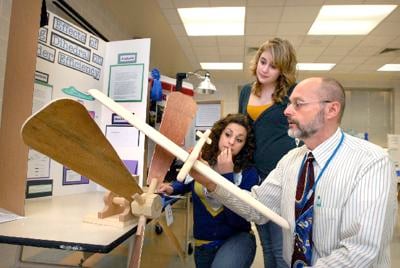All About Professional Math Teachers: Their Duty in Fostering Trainee Development and Accomplishment in Mathematics Education And Learning
Qualified mathematics teachers are essential in forming pupils' understanding and gratitude of mathematics. Their deep understanding and efficient mentor approaches can substantially affect student outcomes. These teachers not just present mathematical abilities yet additionally promote an inclusive setting that meets diverse discovering requirements. As they take on innovative approaches, the inquiry develops: how do these methods particularly boost pupil involvement and success in math?
The Significance of Certified Mathematics Educators in Education And Learning
Although many variables add to trainee success in maths, the visibility of certified mathematics educators stands out as an important element in fostering reliable learning settings. Study constantly suggests that trainees taught by teachers with strong mathematical histories tend to show greater levels of understanding and achievement. Qualified mathematics instructors not just possess a deep understanding of mathematical principles yet additionally the instructional abilities necessary to convey complicated concepts in easily accessible means. They can determine pupils' specific demands and adjust their mentor approaches appropriately, promoting inclusivity and interaction. On top of that, their know-how allows them to develop a favorable classroom atmosphere that encourages risk-taking and durability in analytic. This supportive environment fosters a development way of thinking amongst students, improving their self-confidence and inspiration in maths. On the whole, qualified mathematics educators play a crucial function fit students' perspectives toward mathematics, inevitably influencing their academic trajectories and future possibilities.
Secret Top Qualities of Efficient Mathematics Educators
Effective math educators possess several essential high qualities that boost their training effectiveness. These include deep subject understanding, strong communication abilities, and flexible training methods that deal with diverse learning needs. Recognizing and cultivating these features can substantially influence trainee understanding and interaction in maths.
Deep Subject Knowledge
While a strong pedagogical approach is necessary, deep subject knowledge remains a foundation of effective mathematics teachers. Such understanding allows educators to recognize mathematical principles completely and to prepare for pupil mistaken beliefs. Educators with a solid understanding of mathematics not just supply web content with self-confidence but also connect various topics, fostering a richer understanding environment. They are furnished to apply diverse mentor approaches that satisfy different discovering styles, making complicated ideas more accessible. Furthermore, deep subject knowledge empowers educators to involve in significant discussions with pupils, motivating crucial reasoning and problem-solving abilities. Eventually, the depth of recognizing that math educators possess considerably affects pupils' scholastic growth and accomplishment in maths, laying a solid foundation for future learning.

Strong Interaction Abilities
Deep subject expertise alone is not enough for promoting an efficient knowing environment in mathematics; strong interaction abilities are equally vital for reliable mathematics teachers. These skills make it possible for educators to communicate complicated ideas in available ways, making sure that students realize foundational ideas. Effective communication entails not only clarity yet likewise the ability to actively listen, encouraging pupil participation and addressing mistaken beliefs. By cultivating an open dialogue, teachers produce a helpful classroom atmosphere where trainees really feel comfortable asking inquiries and expressing their thoughts. Furthermore, strong communicators can adapt their language and explanations to suit varied learning styles, enhancing pupil interaction and understanding. Ultimately, efficient interaction bridges the gap between an instructor's understanding and a trainee's understanding, considerably impacting scholastic accomplishment in maths.
Flexible Teaching Techniques
A range of flexible teaching methods are crucial for effective mathematics instructors intending to meet the varied demands of their pupils. These approaches enable teachers to tailor their instruction based on private understanding capacities, styles, and rate of interests. qualified math teachers. Methods such as differentiated instruction, where teachers customize item, process, or material, help address varying efficiency levels. In addition, including modern technology and interactive devices can improve involvement and facilitate customized discovering experiences. Formative evaluations enable teachers to monitor progress and change mentor approaches as necessary. Collaborative group work promotes peer understanding, fostering a supportive setting. By utilizing these flexible approaches, math educators can develop comprehensive classrooms that encourage all students to prosper and attain their academic goals, eventually promoting a love for mathematics
Cutting-edge Mentor Techniques Used by Math Teachers
As teachers look for to engage pupils better, ingenious training techniques have become a prime focus in math classrooms. These techniques aim to enhance understanding and retention of mathematical ideas. One popular approach is using modern technology, such as interactive software and online simulations, which allows students to picture complex problems and receive immediate feedback.Additionally, project-based discovering urges cooperation and real-world application of mathematics principles, promoting vital assuming skills. Gamification, where mathematics concepts are incorporated into game-like environments, has actually also gotten appeal, making learning much more delightful and motivating for students.Moreover, set apart direction dressmakers lessons to fit varying skill levels, making sure that all trainees can proceed at their very own rate. By utilizing these ingenious methods, math instructors produce vibrant knowing experiences, eventually promoting better trainee growth and accomplishment in maths.
Producing Inclusive Understanding Atmospheres
Producing inclusive knowing settings in mathematics education involves implementing varied understanding approaches and promoting collaborative group activities. These methods cater to the varied needs of students, making sure that every person has the possibility to prosper and engage. By prioritizing inclusivity, math teachers can grow a classroom environment that sustains all learners.
Diverse Discovering Approaches
While lots of educators venture to cultivate comprehensive learning environments, executing diverse learning strategies is vital for effectively reaching all trainees. These methods incorporate an array of training techniques tailored to fit differing discovering capabilities, backgrounds, and designs. For example, incorporating aesthetic aids, manipulatives, and technology can engage trainees who might struggle with traditional guideline. Furthermore, set apart guideline allows instructors to modify assessments and projects, making sure that every pupil can access the educational program at their very own level. Culturally receptive pedagogy likewise plays a substantial duty in identifying and valuing the diverse experiences of trainees, thereby improving their link to the product. By making use of these diverse understanding methods, certified mathematics educators can develop a supportive ambience where all pupils are encouraged to be successful in maths.
Collaborative Group Activities

The Impact of Certified Mathematics Teachers on Pupil Success
The presence of qualified math instructors substantially affects pupil accomplishment, as reliable instruction can link voids in understanding and foster a favorable learning setting. Study shows that pupils instructed by knowledgeable instructors show greater levels of effectiveness in mathematical concepts compared to their peers. Qualified mathematics educators have a deep understanding of mathematical web content, enabling them to existing material in diverse ways that accommodate various finding out designs. This adaptability not just enhances understanding but additionally improves student self-confidence in their abilities.Moreover, certified instructors typically employ formative evaluations to keep an eye on pupil development, permitting for prompt interventions when essential. Their capacity to produce engaging lessons motivates student involvement and promotes a growth frame of mind. Therefore, the effect of certified math educators expands beyond plain academic efficiency; it grows a feeling of curiosity and durability in pupils, eventually causing boosted outcomes in maths and a more powerful structure for future knowing.
Techniques for Involving Students in Mathematics
Engaging trainees in mathematics requires a complex technique that integrates diverse approaches to catch their interest and enhance understanding. One reliable strategy is using real-world applications, permitting students to see the significance go right here of mathematical concepts in daily life. Including innovation, such as interactive software and on the internet resources, can additionally promote involvement by providing dynamic understanding experiences.Group work motivates partnership, enabling pupils to gain from one another and create analytic skills in a supportive environment. Additionally, incorporating video games and hands-on activities can make finding out even more accessible.differentiated and satisfying guideline satisfies different discovering designs, guaranteeing that all trainees can get in touch with the material. Providing timely comments aids students recognize their progress and areas for enhancement, cultivating a growth state of mind. By employing these strategies, instructors can create an engaging math class that advertises pupil growth and accomplishment.
The Role of Specialist Advancement in Enhancing Mathematics Teaching Abilities
While many instructors acknowledge the significance of reliable teaching strategies, specialist advancement plays an important role in boosting math teaching abilities (qualified math teachers). Continuous training chances allow instructors to remain present with instructional advancements, mathematical material, and technological devices. Workshops and workshops provide discussion forums for teachers to collaborate, share finest practices, and talk find more about difficulties they come across in the classroom.Furthermore, professional growth promotes a development frame of mind among educators, urging them to reflect on their practices and adjust their techniques based upon student requirements. This ongoing learning process not just enhances teachers' mathematical understanding but likewise equips them with cutting-edge instructional techniques that can result in improved student interaction and achievement.Ultimately, a structured professional development program can significantly impact the top quality of mathematics education, ensuring that educators are well-prepared to influence and guide their trainees towards success in maths
Often Asked Questions
What Certifications Are Required to Come To Be a Mathematics Teacher?
To come to be a math educator, people normally need a bachelor's degree in mathematics or education, teaching certification, and a solid understanding of mathematical ideas. Additional qualifications might consist of specialized training in rearing and class administration skills.

How Do Math Educators Assess Trainee Development in the Classroom?
Math educators examine trainee development through numerous methods, consisting of tests, tests, and jobs (qualified math teachers). They additionally make use of empirical assessments and trainee involvement to evaluate understanding, changing direction based upon private and group performance to boost finding out end results
What Obstacles Do Mathematics Educators Generally Face?
Math educators commonly deal with challenges such as varying trainee ability levels, restricted sources, curriculum restrictions, and the requirement to engage students effectively. Additionally, they typically encounter stress to enhance standard examination scores and manage class behavior.
How Can Moms And Dads Assistance Their Kid's Math Education?
Moms and dads can support their kid's mathematics education by giving a favorable understanding atmosphere, participating in math-related activities, urging a positive mindset towards difficulties, and preserving open communication with teachers to keep an eye on development and address worries.
What Resources Are Available for Mathematics Educators to Enhance Their Abilities?
Different sources are readily available for math teachers, including on-line programs, professional development workshops, peer cooperation groups, academic internet sites, and mentor journals. These devices boost instructional methods, strengthen subject understanding, and ultimately enhance student discovering end results in mathematics. Certified math teachers are vital in shaping students' understanding and admiration of mathematics. Numerous factors add to student success in maths, the existence of certified mathematics educators stands out as a critical aspect in cultivating effective understanding environments. Furthermore, certified mathematics educators assist in these interactions by tactically organizing trainees, ensuring that each team includes a mix of skill levels and backgrounds. The visibility of qualified math instructors significantly affects pupil achievement, as efficient instruction can connect spaces in understanding and promote a favorable understanding atmosphere. Mathematics teachers generally face challenges such as like this differing pupil ability degrees, limited resources, educational program constraints, and the requirement to involve trainees efficiently.